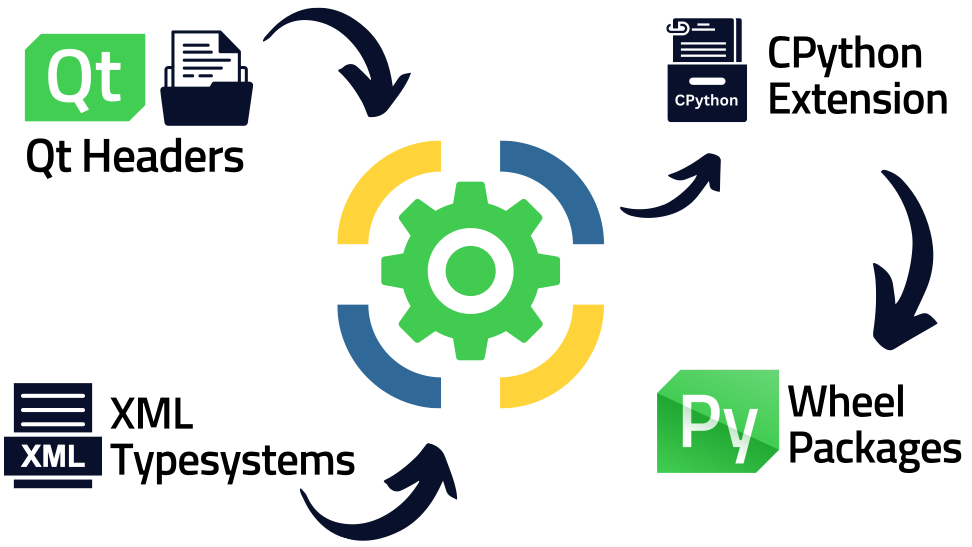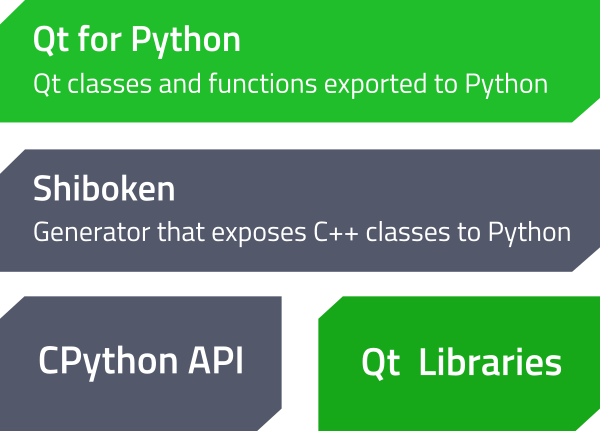Generator Overview¶
The following diagram summarizes Shiboken’s role in the Qt for Python project.

An XML typesystem file is used to specify the types to be exposed to Python and to apply modifications to properly represent and manipulate the types in the Python World. For example, you can remove and add methods to certain types, and also modify the arguments of each method. These actions are inevitable to properly handle the data structures or types.
The final outcome of this process is a set of wrappers written in CPython, which can be used as a module in your Python code.
In a few words, the Generator is a utility that parses a collection of header and typesystem files, generating other files (code, documentation, etc.) as result.
Creating new bindings¶

Creating new bindings¶
Each module of the generator system has an specific role.
Provide enough data about the classes and functions.
Generate valid code, with modifications from typesystems and injected codes.
Modify the API to expose the objects in a way that fits you target language best.
Insert customizations where handwritten code is needed.

Runtime architecture¶
The newly created binding will run on top of Shiboken which takes care of interfacing Python and the underlying C++ library.
Handwritten inputs¶
Creating new bindings involves creating several pieces of “code”: the header, the typesystem and, in most cases, the injected code.
- header A header with
#includedirectives listing all the headers of the desired classes. This header is not referenced by the generated code. Alternatively, it is possible to pass a list of the headers of the desired classes directly on the command line. In this case, the command line option
--use-global-headershould be passed as well to prevent the headers from being suppressed in the generated code.- :typesystem: XML files that provides the developer with a tool to customize the
way that the generators will see the classes and functions. For example, functions can be renamed, have its signature changed and many other actions.
- :inject code: allows the developer to insert
handwritten code where the generated code is not suitable or needs some customization.
Command line options¶
Usage¶
shiboken [options] header-file(s) typesystem-file
Options¶
--disable-verbose-error-messagesDisable verbose error messages. Turn the CPython code hard to debug but saves a few kilobytes in the generated binding.
--enable-parent-ctor-heuristicThis flag enable an useful heuristic which can save a lot of work related to object ownership when writing the typesystem. For more info, check Parentship heuristics.
--enable-pyside-extensionsEnable pyside extensions like support for signal/slots. Use this if you are creating a binding based on PySide.
--enable-return-value-heuristicEnable heuristics to detect parent relationship on return values. For more info, check Return value heuristics.
--avoid-protected-hackAvoid the use of the ‘#define protected public’ hack.
--use-isnull-as-nb-boolIf a class has an isNull() const method, it will be used to compute the value of boolean casts (see Bool Cast). The legacy option
--use-isnull-as-nb_nonzerohas the same effect, but should not be used any more.--lean-headersForward declare classes in module headers instead of including their class headers where possible.
--use-operator-bool-as-nb-boolIf a class has an operator bool, it will be used to compute the value of boolean casts (see Bool Cast). The legacy option
--use-operator-bool-as-nb_nonzerohas the same effect, but should not be used any more.
--no-implicit-conversionsDo not generate implicit_conversions for function arguments.
--api-version=<version>Specify the supported api version used to generate the bindings.
--documentation-onlyDo not generate any code, just the documentation.
--drop-type-entries="<TypeEntry0>[;TypeEntry1;...]"Semicolon separated list of type system entries (classes, namespaces, global functions and enums) to be dropped from generation. Values are fully qualified Python type names (‘Module.Class’), but the module can be omitted (‘Class’).
-keywords=keyword1[,keyword2,...]A comma-separated list of keywords for conditional typesystem parsing (see Conditional Processing).
--use-global-headerUse the global headers passed on the command line in generated code.
--generation-setGenerator set to be used (e.g. qtdoc).
--skip-deprecatedSkip deprecated functions.
--diffPrint a diff of wrapper files.
--dryrunDry run, do not generate wrapper files.
--project-file=<file>Text file containing a description of the binding project. Replaces and overrides command line arguments.
--clang-option=<option>Option to be passed to clang
--clang-options=<option1>[,<option2>,...]>Options to be passed to clang. When ‘-’ is passed as the first option in the list, none of the options built into shiboken will be added, allowing for a complete replacement.
--compiler=<type>Emulated compiler type (g++, msvc, clang)
--compiler-path=<file>Path to the compiler for determining builtin include paths
compiler-argument=<argument>Add an argument for the compiler for determining builtin include paths
--platform=<name>Emulated platform (
android,darwin,ios,linux,unix,windows).CMAKE_SYSTEM_NAMEmay be used.
--platform-version=<version>Platform version
--arch=<name>Emulated architecture (
x86_64,arm64,i586).CMAKE_SYSTEM_PROCESSORmay be used.
-I<path>, --include-paths=<path>[:<path>:...]Include paths used by the C++ parser.
-isystem<path>, --system-include-paths=<path>[:<path>:...]System include paths used by the C++ parser
-F<path>, --framework-include-paths=<path>[:<path>:...]Framework include paths used by the C++ parser
--force-process-system-include-paths=<path>[:<path>:...]Include paths that are considered as system headers by the C++ parser, but should still be processed to extract types
--language-level=, -std=<level>C++ Language level (c++11..c++17, default=c++14)
-T<path>, --typesystem-paths=<path>[:<path>:...]Paths used when searching for type system files.
--output-directory=[dir]The directory where the generated files will be written.
--license-file=[license-file]File used for copyright headers of generated files.
--no-suppress-warningsShow all warnings.
--log-unmatchedPrints suppress-warning and rejection elements that were not matched. This is useful for cleaning up old type system files.
--silentAvoid printing any message.
--debug-level=[sparse|medium|full]Set the debug level.
--helpDisplay this help and exit.
--print-builtin-typesPrint information about builtin types
--versionOutput version information and exit.
QtDocGenerator Options¶
--doc-parser=<parser>The documentation parser used to interpret the documentation input files (qdoc|doxygen).
--documentation-code-snippets-dir=<dir>Directory used to search code snippets used by the documentation.
--documentation-data-dir=<dir>Directory with XML files generated by documentation tool.
--documentation-extra-sections-dir=<dir>Directory used to search for extra documentation sections.
--library-source-dir=<dir>Directory where library source code is located.
--additional-documentation=<file>List of additional XML files to be converted to .rst files (for example, tutorials).
--inheritance-file=<file>Generate a JSON file containing the class inheritance.
--disable-inheritance-diagramDisable the generation of the inheritance diagram.
Binding Project File¶
Instead of directing the Generator behavior via command line, the binding developer can write a text project file describing the same information, and avoid the hassle of a long stream of command line arguments.
The project file structure¶
Here follows a comprehensive example of a generator project file.
[generator-project]
generator-set = path/to/generator/CHOICE_GENERATOR
header-file = DIR/global.h" />
typesystem-file = DIR/typesystem_for_your_binding.xml
output-directory location="OUTPUTDIR" />
include-path = path/to/library/being/wrapped/headers/1
include-path = path/to/library/being/wrapped/headers/2
typesystem-path = path/to/directory/containing/type/system/files/1
typesystem-path = path/to/directory/containing/type/system/files/2
enable-parent-ctor-heuristic
Cross Compilation¶
Shiboken uses libclang to parse the headers of the library to be exposed. When compiling for another platform, the clang parser should ideally use the target of the platform.
Simple bindings may already work when the parser uses the default host platform
target. But for bigger projects like Qt, it is important that macros like
QT_POINTER_SIZE and the platform defines Q_OS_XXX are set correctly
when parsing files like qsystemdetection.h or qprocessordetection.h.
Some Qt API might be excluded depending on platform and there might be subtle
differences depending on word size.
For platform and architecture, the relevant command line options are
--platform=<name> and --arch=<name>. They take common platform names
and architectures as used in target triplets and can be set to the values of
the CMake variables CMAKE_SYSTEM_NAME and CMAKE_SYSTEM_PROCESSOR,
respectively. If the specified platform is different from the host, Shiboken
will pass a target triplet based on them to the clang parser.
Optionally, the version of the platform can be specified using the --platform-version=<version>. This is useful when the clang parser defaults to a too-old version.
If this results in a wrong or too generic triplet, it is also possible to directly pass a target triplet in the Clang options specified by --clang-option=<option>. In this case, Shiboken will not pass a target triplet and try to derive the platform/architecture from this triplet.
When using the Clang and GNU compilers for cross-compiling, the
--compiler-path=<file> option should be specified since Shiboken may need
to run the compiler to determine system include paths. For most cases, passing
the value of the CMake variable CMAKE_CXX_COMPILER should work. If the
compiler is in the path, it should suffice to pass the compiler type to
--compiler=<type> (value of CMAKE_CXX_COMPILER_ID).
It is possible (for example, when targeting Android) that CMAKE_CXX_COMPILER
is a generic compiler that also needs a --target= or similar option to
locate the correct system include paths. In this case (shiboken failing due to
not finding some system headers), the compiler-argument=<argument> can be
passed to specify the target.
Typically, a CMakeLists.txt files will then look like:
if (CMAKE_CROSSCOMPILING)
list(APPEND shiboken_command "--platform=${CMAKE_SYSTEM_NAME}"
"--arch=${CMAKE_SYSTEM_PROCESSOR}"
"--compiler-path=${CMAKE_CXX_COMPILER}")
endif()
When passing the target triplet:
if (CMAKE_CROSSCOMPILING)
list(APPEND shiboken_command "--clang-option=--target=aarch64-none-linux-android"
"--compiler-path=${CMAKE_CXX_COMPILER}")
endif()
CMake Usage¶
The Shiboken6Tools CMake package provides an easy way to invoke the
Shiboken generator from CMake to create Python bindings for C++ libraries. It
is contained in the shiboken6_generator wheel. This is achieved using the
shiboken_generator_create_binding CMake function. This function automates
the process of generating binding sources and building the Python extension
module.
Function Signature¶
shiboken_generator_create_binding(
TARGET_NAME <name>
GENERATED_SOURCES <generated_sources>
HEADERS <headers>
TYPESYSTEM_FILE <typesystem_file>
CPP_LIBRARY <cpp_library>
[QT_MODULES <qt_modules>]
[EXTRA_OPTIONS <extra_options>]
[FORCE_LIMITED_API]
)
Arguments¶
TARGET_NAME: Name of the Python extension module target to create.GENERATED_SOURCES: List of C++ source files generated by Shiboken.HEADERS: List of C++ header files to parse.TYPESYSTEM_FILE: Path to the typesystem XML file.CPP_LIBRARY: C++ library to link against.QT_MODULES(optional): List of Qt modules required for the binding.EXTRA_OPTIONS(optional): Additional command line options for Shiboken.FORCE_LIMITED_API(optional): Use the Limited API for the generated extension module.
Usage Example¶
shiboken_generator_create_binding(
TARGET_NAME MyBinding
GENERATED_SOURCES ${generated_sources}
HEADERS ${wrapped_header}
TYPESYSTEM_FILE ${typesystem_file}
CPP_LIBRARY ${my_library}
QT_MODULES Core Gui Widgets
EXTRA_OPTIONS --some-extra-option
FORCE_LIMITED_API
)
This macro will generate the binding sources, build the Python module, and link it with the specified libraries and include paths.
For complete usage examples, see: